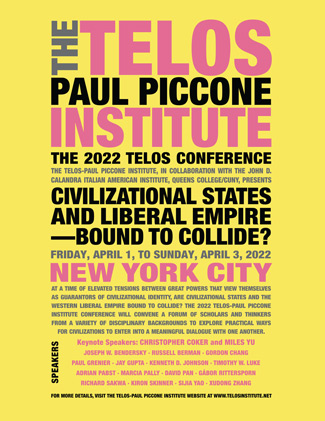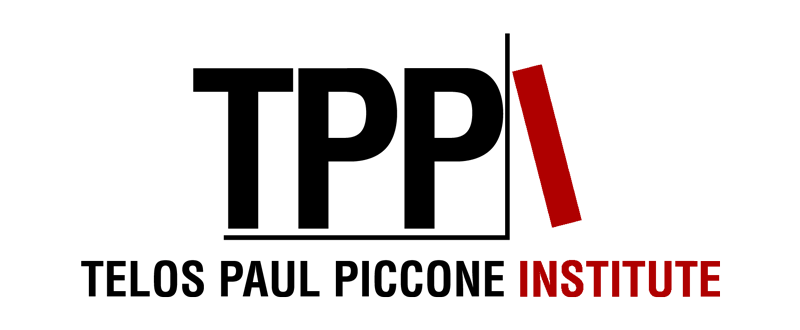The 2022 Telos-Paul Piccone Institute Conference
April 1–3, 2022
The John D. Calandra Italian American Institute, Queens College/CUNY
New York, NY
Civilizational States and Liberal Empire—Bound to Collide?
Keynote Speakers
Christopher Coker, London School of Economics
Miles Yu, U.S. Naval Academy
Conference program (PDF)
Press about the conference
Conference videos
Conference Description
 Civilization seems to be the new pivot of international relations. Brexit, Trump, and the resurgence of Russia and China have put culture and civilizational identity at the heart of both domestic politics and foreign policy. From the identity politics that is sweeping much of the West to the pushback against the supposed universalism of the West's liberal empire in much of the non-Western world, civilizational norms are as important as military might and economic prosperity. As Christopher Coker puts it in his book The Rise of the Civilizational State, we are "living in a world in which civilization is fast becoming the currency of international politics."
Civilization seems to be the new pivot of international relations. Brexit, Trump, and the resurgence of Russia and China have put culture and civilizational identity at the heart of both domestic politics and foreign policy. From the identity politics that is sweeping much of the West to the pushback against the supposed universalism of the West's liberal empire in much of the non-Western world, civilizational norms are as important as military might and economic prosperity. As Christopher Coker puts it in his book The Rise of the Civilizational State, we are "living in a world in which civilization is fast becoming the currency of international politics."
The worldwide pandemic has amplified and accelerated this fundamental shift in geopolitics. China and the United States are not just locked into trade wars but also in a contest over norms and values—authoritarian vs. democratic, state capitalism vs. market fundamentalism, federal polity vs. unitary statehood.
We are witnessing not an era of change but a change of era. Gone is the optimism of the post-1989 years. Instead of ever-greater globalization and the respect of universal human rights based on multilateralism and free trade, the world is seeing the rise of nationalism and a retreat to national isolation anchored in populism and protectionism. Values such as democracy, human rights, and fundamental freedoms are not only contested but also seen by many powers as subordinate to national cultures or civilizational traditions. China, Russia, India, and Turkey view themselves as civilizational states that are leading the way against a decadent and weak Western liberal empire.
Civilization is also at stake within the West. The liberalism that has been dominant for the past forty years or so focused on certain values such as individual freedom and opportunity, which mostly amounts to free choice and the embrace of global mobility and endless change. But over time these values—or the ways of implementing them—have clashed with people's search for settled ways of life—around home, community, and country. The populist insurgency is in part a reflection of this backlash against a politics of the global rather than the national and the local, a politics of utopia rather than place, and a politics of individualized identity rather than shared belonging. In short, we are seeing a clash of values and norms, often linked to so-called "culture wars."
At a time of heightened tensions between great powers that view themselves as guarantors of civilizational identity, are civilizational states and the Western liberal empire bound to collide? In the past, clashes tended to occur primarily within civilizations rather than between them—e.g., Catholics vs. Protestants, the United States vs. Europe, Shia vs. Sunni, Westernizers vs. Slavophiles in Russia. Today we may be witnessing a civilizational contest between the United States and China, with Europe largely absent from the geopolitical scene and Russia increasingly absorbed into Beijing's orbit. Was Samuel Huntington half-right after all?
This conference has two objectives. The first is to bring greater conceptual clarity to current debates by exploring some of the key terms, notably the relationship between "culture" and "civilization" and between "values" and "norms." Connected with this is a focus on civilizations in a world without a single hegemon. How can we recognize, respect, and even celebrate differences between cultures and civilizations without sliding into violent conflict? How can we avoid homogenizing identity while also upholding common values?
The second objective is to explore some practical ways for civilizations to enter into a meaningful dialogue with one another. Our emphasis will be on bringing together groups of academics and commentators who can develop a set of novel ideas and perhaps even policy proposals.
Key questions include:
- Are cultural and civilizational identities central to politics and international affairs?
- Why do Russia and China identify as civilizational states?
- Is the West a liberal empire? Does this apply to Europe more than to the United States?
- What can controversial thinkers such as Herder and Huntington teach us about culture and civilization?
- Is there such a thing as universal values? Are norms culture- or civilization-specific?
- Does the pandemic amplify or mitigate cultural and civilizational tensions?
Conference Speakers
Our keynote speakers will be Christopher Coker of the London School of Economics and Miles Yu of the U.S. Naval Academy. Invited speakers include:
- Joseph W. Bendersky (Virginia Commonwealth University)
- Russell A. Berman (Stanford University)
- Gordon Chang, author of The Coming Collapse of China and The Great U.S.–China Tech War
- Paul Grenier (Simone Weil Center)
- Jay Gupta (Mills College)
- Tim Luke (Virgina Tech)
- Adrian Pabst (University of Kent)
- Marcia Pally (New York University)
- David Pan (University of California at Irvine)
- Gábor Rittersporn (Centre National de la Recherche Scientifique)
- Richard Sakwa (University of Kent)
- Kiron Skinner (Carnegie Mellon University)
- Sijia Yao (University of Nebraska–Lincoln)
- Xudong Zhang (New York University)
Press about the Conference
Alex Hu, "The Allure of the Civilizational State," National Interest, May 5, 2022.
Conference Videos
First Keynote Presentation by Miles Yu:
Escape from Civilization's Predicaments
Moderated by David Pan
Second Keynote Presentation by Christopher Coker:
The Civilizational State and the Crisis of World Order
Moderated by Adrian Pabst
Panel discussion with Russell A. Berman, Christopher Coker, Adrian Pabst, Marcia Pally, and Kiron Skinner
Plenary 1: Russia, Civilization, and Western Liberalism
With Richard Sakwa, Paul Grenier, Gábor Rittersporn, and Matthew Dal Santo
Moderated by Adrian Pabst
Plenary 2: U.S.–China Relations in a World of Civilizational Competition
With Kiron Skinner, Gordon Chang, and Xudong Zhang
Moderated by Russell A. Berman
Plenary 3: Universalism, Pluralism, and Particularism
With Joseph W. Bendersky, Marcus Charlesworth, David Pan, and Jacob Ulmschneider
Moderated by Marcia Pally
